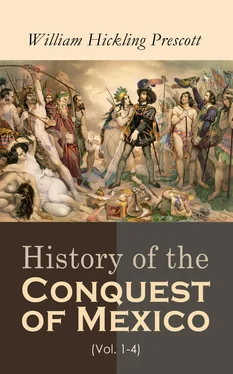Great was the amazement of the good citizens of St. Jago when, at dawn, they saw that the fleet, which they knew was so ill prepared for the voyage, had left its moorings and was busily getting under way. The tidings soon came to the ears of his Excellency, who, springing from his bed, hastily dressed himself, mounted his horse, and, followed by his retinue, galloped down to the quay. Cortés, as soon as he descried their approach, entered an armed boat, and came within speaking-distance of the shore. “And is it thus you part from me?” exclaimed Velasquez; “a courteous way of taking leave, truly!” “Pardon me,” answered Cortés; “time presses, and there are some things that should be done before they are even thought of. Has your Excellency any commands?” But the mortified governor had no commands to give; and Cortés, politely waving his hand, returned to his vessel, and the little fleet instantly made sail for the port of Macaca, about fifteen leagues distant. (November 18, 1518.) Velasquez rode back to his house to digest his chagrin as he best might; satisfied, probably, that he had made at least two blunders,—one in appointing Cortés to the command, the other in attempting to deprive him of it. For, if it be true that by giving our confidence by halves we can scarcely hope to make a friend, it is equally true that by withdrawing it when given we shall make an enemy. [517]
This clandestine departure of Cortés has been severely criticised by some writers, especially by Las Casas. [518]Yet much may be urged in vindication of his conduct. He had been appointed to the command by the voluntary act of the governor, and this had been fully ratified by the authorities of Hispaniola. He had at once devoted all his resources to the undertaking, incurring, indeed, a heavy debt in addition. He was now to be deprived of his commission, without any misconduct having been alleged or at least proved against him. Such an event must overwhelm him in irretrievable ruin, to say nothing of the friends from whom he had so largely borrowed, and the followers who had embarked their fortunes in the expedition on the faith of his commanding it. There are few persons, probably, who, under these circumstances, would have felt called tamely to acquiesce in the sacrifice of their hopes to a groundless and arbitrary whim. The most to have been expected from Cortés was that he should feel obliged to provide faithfully for the interests of his employer in the conduct of the enterprise. How far he felt the force of this obligation will appear in the sequel.
From Macaca, where Cortés laid in such stores as he could obtain from the royal farms, and which, he said, he considered as “a loan from the king,” he proceeded to Trinidad; a more considerable town, on the southern coast of Cuba. Here he landed, and, erecting his standard in front of his quarters, made proclamation, with liberal offers to all who would join the expedition. Volunteers came in daily, and among them more than a hundred of Grijalva’s men, just returned from their voyage and willing to follow up the discovery under an enterprising leader. The fame of Cortés attracted, also, a number of cavaliers of family and distinction, some of whom, having accompanied Grijalva, brought much information valuable for the present expedition. Among these hidalgos may be mentioned Pedro de Alvarado and his brothers, Cristóval de Olid, Alonso de Avila, Juan Velasquez de Leon, a near relation of the governor, Alonso Hernandez de Puertocarrero, and Gonzalo de Sandoval,—all of them men who took a most important part in the Conquest. Their presence was of great moment, as giving consideration to the enterprise; and, when they entered the little camp of the adventurers, the latter turned out to welcome them amidst lively strains of music and joyous salvos of artillery.
Cortés meanwhile was active in purchasing military stores and provisions. Learning that a trading-vessel laden with grain and other commodities for the mines was off the coast, he ordered out one of his caravels to seize her and bring her into port. He paid the master in bills for both cargo and ship, and even persuaded this man, named Sedeño, [519]who was wealthy, to join his fortunes to the expedition. He also despatched one of his officers, Diego de Ordaz, in quest of another ship, [520]of which he had tidings, with instructions to seize it in like manner, and to meet him with it off Cape St. Antonio, the westerly point of the island. [521]By this he effected another object, that of getting rid of Ordaz, who was one of the governor’s household, and an inconvenient spy on his own actions.
While thus occupied, letters from Velasquez were received by the commander of Trinidad, requiring him to seize the person of Cortés and to detain him, as he had been deposed from the command of the fleet, which was given to another. This functionary communicated his instructions to the principal officers in the expedition, who counselled him not to make the attempt, as it would undoubtedly lead to a commotion among the soldiers, that might end in laying the town in ashes. Verdugo thought it prudent to conform to this advice. [522]
As Cortés was willing to strengthen himself by still further reinforcements, he ordered Alvarado with a small body of men to march across the country to the Havana, [523]while he himself would sail round the westerly point of the island and meet him there with the squadron. In this port he again displayed his standard, making the usual proclamation. He caused all the large guns to be brought on shore, and, with the small arms and cross-bows, to be put in order. As there was abundance of cotton raised in this neighborhood, he had the jackets of the soldiers thickly quilted with it, for a defence against the Indian arrows, from which the troops in the former expeditions had grievously suffered. He distributed his men into eleven companies, each under the command of an experienced officer; and it was observed that, although several of the cavaliers in the service were the personal friends and even kinsmen of Velasquez, he appeared to treat them all with perfect confidence.
His principal standard was of black velvet, embroidered with gold, and emblazoned with a red cross amidst flames of blue and white, with this motto in Latin beneath: “Friends, let us follow the Cross; and under this sign, if we have faith, we shall conquer.” He now assumed more state in his own person and way of living, introducing a greater number of domestics and officers into his household, and placing it on a footing becoming a man of high station. This state he maintained through the rest of his life. [524]
Cortés at this time was thirty-three, or perhaps thirty-four, years of age. In stature he was rather above the middle size. His complexion was pale; and his large dark eye gave an expression of gravity to his countenance, not to have been expected in one of his cheerful temperament. His figure was slender, at least until later life; but his chest was deep, his shoulders broad, his frame muscular and well proportioned. It presented the union of agility and vigor which qualified him to excel in fencing, horsemanship, and the other generous exercises of chivalry. In his diet he was temperate, careless of what he ate, and drinking little; while to toil and privation he seemed perfectly indifferent. His dress, for he did not disdain the impression produced by such adventitious aids, was such as to set off his handsome person to advantage; neither gaudy nor striking, but rich. He wore few ornaments, and usually the same; but those were of great price. His manners, frank and soldier-like, concealed a most cool and calculating spirit. With his gayest humor there mingled a settled air of resolution, which made those who approached him feel they must obey, and which infused something like awe into the attachment of his most devoted followers. Such a combination, in which love was tempered by authority, was the one probably best calculated to inspire devotion in the rough and turbulent spirits among whom his lot was to be cast.
Читать дальше












